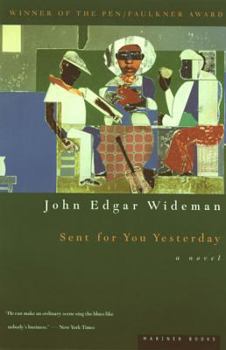Sent for You Yesterday
Select Format
Select Condition 
Book Overview
Lucy and Carl struggle to prevent the extinction of the Black community of Homewood and to keep alive the musical heritage of the blues piano player, Albert Wilkes. This description may be from another edition of this product.
Format:Paperback
Language:English
ISBN:0395877296
ISBN13:9780395877296
Release Date:April 1998
Publisher:Mariner Books
Length:208 Pages
Weight:0.51 lbs.
Dimensions:0.5" x 5.6" x 8.6"
Customer Reviews
4 ratings
Wideman Mastery of Language Is Astonishing
Published by Thriftbooks.com User , 19 years ago
From www.thetasteland.blogspot.com Sent for you yesterday, and here you come today. It only makes sense that one of the main themes of John Edgar Wideman's Pen/Faulkner Award winning novel, Sent For You Yesterday, should find expression in a song. Any novel written with the musical lyricism and jive, stream of consciousness language Wideman employs is attempting to bridge the gap between music and literature. Wideman takes the blues out of the jazz clubs and places it squarely on the page for the readers' benefit. Sent For You Yesterday is a marvel to read, not only for its eloquent exposition of urban African American culture, but also simply for the beauty of Wideman's words. If James Joyce had been born in inner city Pittsburgh instead of Dublin, his writing would most likely have sounded much like Wideman's. Wideman shifts flawlessly from one characters' thoughts to the next, detailing the exclusion felt by the albino Brother in an all black community, to the lunacy of Samantha, a mother of over 10 children who loses her mind when one of her children burns to death. World War II clouds over this novel in the same way World War I is the ever-present unmentioned in Woolf's To The Lighthouse. Wideman draws on the modernists, but in a completely original manner. The lives he shows us are real and hard, their importance obviously apparent but unbearably tragic. Through it all, Wideman's characters persevere, suffering through life, even as they acknowledge it will only get worse. In their brave embrace of life, there is a profound sublimity. One consolation is music - it is also their heritage for people otherwise without possessions. Any discussion of the characters in Sent For You Yesterday must begin by first acknowledging that the Pittsburgh area of Homewood is the main character. Though he is wanted by the police for sleeping with a white woman, Albert Wilkes' has to return to Homewood. The place draws him back. He has traveled for seven years but only in Homewood does he feel at home. His re-arrival in Homewood frames the novel's first section, while the rest of the book focuses on Lucy Tate, the narrator's Uncle Carl, and Lucy's surrogate brother called only Brother, and their relative inability to leave Homewood at all. The gravity of the town seems to possess the work's human characters. Homewood exerts a force originating out of its inescapable history; even as its houses crumble, its people drink and drug themselves to death, and poverty comes to dominate like a despot, Lucy, Carl, and Brother stay fixed, attached to each other, but more so to the place. The only of the self-termed "Three Musketeers" who figures out a way to leave Homewood is Brother and he does so through suicide, symbolically mauled by the town's lone link to the outside world, a freight train. Wideman presents his characters not as emblems pleading for our sympathy, but in a matter of fact manner that seems to say: take them as they are or don't take them at all
James Joyce in America
Published by Thriftbooks.com User , 24 years ago
Wideman's constant changing point of view and temporal setting and reminds this reader very much of James Joyce Ulysses; this work is a tour of the consciousness of an entire American Black community spanning several generations in the mid 20th century. The vivid poetry of Black American English speaks immediately of characters predicaments, desires, and dreams. If white folks want to begin to understand black folks, they might take a sip of this fine wine.
Poetic
Published by Thriftbooks.com User , 25 years ago
What I love the most about Wideman is the way in which he evokes the sense of time and lost. His writing style reminds me of a cross between Jean Toomer and Fyodor Dostoeyevski, also two of my favorite writers. This novel takes place in the town of Homewood, PA. It is a predominately black working class neighborhood. Wideman makes Homewood feel so alive and yet slowly dying at the same time. If you've ever had a sense of lost time, lost experiences, lost something but you don't know what, than this is the book to read. No other writer has been able to evoke those feelings within me more than Wideman. (p.s.- As if Wideman wasn't good enough, be on the look out for his multi-talented daughter Jamila in the future!)Best Wishes,Rodney Mitchell
Musical Excursion Into a Haunted Past
Published by Thriftbooks.com User , 26 years ago
I chose this book at random while looking for literature for my students.I found the book brilliant. The author's use of imagery is captivating and the story teaches you its style as you go along. In the beginning the lack of quotation marks is frustrating but then you fall into the rhythm of the voices and you cannot stop reading. By the last third, I was snarling at people who dared to try to interrupt me while I breathlessly pawed through page after page of lyrical poetry and metaphor disguised as a prose work.





